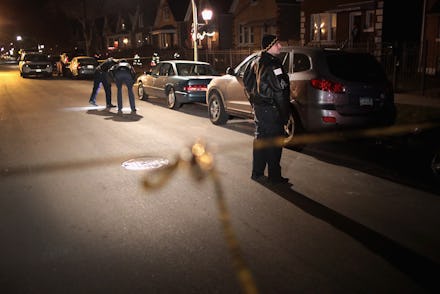Chicago has almost 4 times fewer people than NYC — but 3 times the number of shootings

New York City officials announced in a press conference on Wednesday that the city, the largest in the country with a 2013 population estimate of 8.4 million, had a total of 998 shootings in 2016. That's the lowest number since at least 1994, the New York Times reported. NYC also had 335 murders, close to 2014's all-time low of 333.
But Chicago, the nation's third-largest city with a population of 2.7 million in 2013, recorded more than three times as many shootings in 2016, and more than double the number of murders.
Chicago saw more than 3,500 shootings and 762 murders — the city's highest total since 1997, according to a previous report Times report, and more criminal homicides than New York and Los Angeles combined.
As gun violence fell in New York, it rose in Chicago, where the murder rate increased by 58% over the previous year — leaving many concerned that the city was becoming numb to the violence.
"We should be embarrassed as a city, every single one of us, that we’ve allowed this city to become the poster boy of violence in America," Rev. Michael Pfleger, pastor of a South Side church, told the Times. "Are we just going to shake our heads and say, 'What a terrible year in Chicago?'"
As CNN reports, there are other cities, like Baltimore, New Orleans, St. Louis and Detroit, that have higher per-capita homicide rates. But what's notable in Chicago is the dramatic surge in homicides in a relatively short time frame.
So what explains the dramatic discrepancy?
According to a study released Tuesday in the Journal of the American Medical Association, gun violence in Chicago has spread through "social contagion." Sociologist and one of the study authors Andrew Papachristos told NPR's All Things Considered that it's possible to track gun violence as it spreads person-to-person, much like an infectious disease.
"So if I get shot, for instance, there's a high likelihood that the people around me in my networks will also be victims and that, then, their friends will be victims. And their friends' friends will be victims," Papachristos said. "Not only is it an epidemic, we can actually show in our study how it's transmitted and actually specific individuals who may be at risk."
And if gun violence is an epidemic, solving it may mean treating it as a public health crisis, rather than making it solely the province of law enforcement.
"This takes us out of morality," Gary Slutkin of Cure Violence, a program for treating violence as a health issue that is currently implemented in New York City, told NPR.
"This takes us out of 'these are good people and bad people' into 'there's something going on.' It is contagious and that, when it's managed as a health issue, you can rapidly drop it and sustain drops for long periods of time."